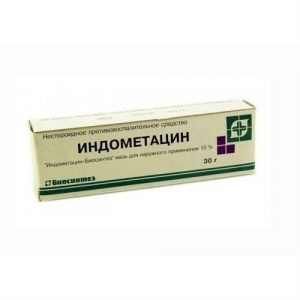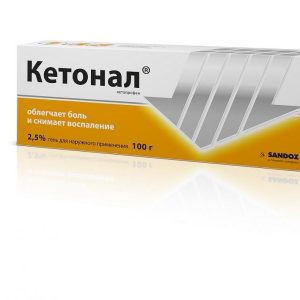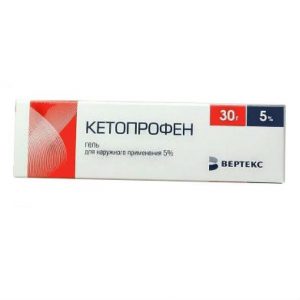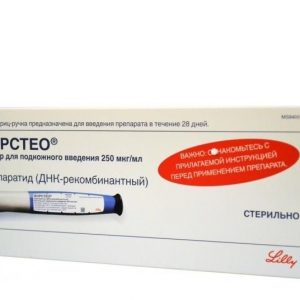Description
Release form
Transparent opacifying 1% hydrogel of the HA polymer (as sodium salt), sterile in glass bottles / syringes 2ml / 20mg.
packaging in one outer packaging one syringe.
Pharmacological action
Sterile synovial fluid prosthesis for intra-articular administration.
Mechanism of action:
Hyaluronic acid (HA, hyaluronate) is a natural high-polymer glycosaminoglycan, consisting of alternating components of N-acetyl-glucosamine and glucuronic acid, which in normal tissues combine in long chains with a molecular weight of up to 10×10 Daltons. HA is synthesized in the cell membrane of synoviocytes and plays a crucial role in the life of the joint. The unique viscoelastic characteristics of a synovial fluid, which: as a fluid with a high viscosity, directly depend on the molecular weight and degree of polymerization of HA provides
frictionless joint surfaces of cartilage with elastic properties, absorbs and dampens sudden changes in intra-articular pressure caused by stress or shock. Of particular importance this factor is for joints experiencing prolonged stress.
These properties of intraarticular fluid are normally due to the specific spatial arrangement of HA molecules with extremely long chains in it: in solutions they have an organization in the form of a disordered volumetric network, while under the influence of shear forces they take a linear position.
HA is also found in high concentration in the surface layer of cartilage, protecting the latter from chemical and physical effects.
The surface layer of cartilage is constantly wearing out and needs to be updated all the time. Therefore, the most important point in the normal functioning of the joint is the maintenance of its homeostasis. Especially, in terms of maintaining the level of synthesis of long HA chains by synoviocytes, as well as the constancy of HA concentration in the intraarticular fluid and the barrier layer of the surface of the cartilage.
With arthrosis, the viscoelasticity of the synovial fluid compared with a healthy joint decreases sharply due to an increase in the relative number of molecules with a small molecular weight and a change in the concentration of HA.
Because of this, the protective (both lubricating and damping, and molecular filtering) properties of the synovial fluid are significantly impaired.
The protective effect of HA in various clinical forms of arthrosis has been recorded in many studies – at the level of coarse and thin tissue, in the study of biochemical markers of decay and cartilage metabolism, as well as at the functional level.
Therefore, the introduction of exogenous HA into the intraarticular cavity can improve the viscoelastic properties of the synovial fluid and increase its protective characteristics.
Indications
GIASTAT ² Ñ is used for primary and secondary joint arthrosis, including traumatic origin, for local restoration of synovial homeostasis, in order to achieve prolonged clinical remission, relief of pain, restoration of mobility to reduce the degree of functional impairment.
Contraindications
Do not use GIASTAT ¢ if you are hypersensitive to one of its components
Do not inject GIASTAT ¢ into a joint with an active stage of inflammation
Do not use GIASTAT ¢ for any infectious processes in joints of
joints any radiological stage of
sr phase and form of origin.
GIASTAT ¢ was not used to treat pregnant women and children under 18 years of age.
Special instructions
Categorically forbidden:
Enter HYASTAT ² Ñ into the joint capsule, blood vessels, misuse as well
Change the viscosity of GIASTAT ² Ñ by diluting it or administer it in the same syringe with other
substances. Use GIASTAT ² Ñ with damaged original packaging
Re-sterilize GIASTAT ² Ñ or use with an expired Expiration.
Composition of
1 vial contains: cefepima hydrochloride 1 g. / syringe with a capacity of 2 ml. contains
-basic substance HA: 20 mg.
– excipients: sodium chloride, phosphate buffer, water.
Dosage and administration
GIASTAT ¢ is injected into the joint cavity. The maximum dose of 2ml / 20mg. in one joint. At the same time, you can make an introduction to several joints. The course of treatment includes from 3 to 5 joint injections, with an interval of 7-10 days. The effectiveness of using HA with a course of less than three injections has not been reliably established.
Side effects of
In some rare cases, in the next 24 hours after the procedure of injection of GIASTAT ¢ in the area of the punctured joint, a number of transient local phenomena are not possible: local soreness, swelling, redness. These manifestations are stopped by the use of local cold therapy, the use of non-steroidal anti-inflammatory drugs and analgesics. Synovitis is rarely possible, the introduction stops before it is stopped.
Drug interactions
Incompatibility of GIASTAT ¢ with other solutions introduced into the joint cavity has not yet been identified.
Storage Conditions
Store in a cool, dark place at + 5 ° C to + 15 ° C.
Attention! Do not freeze! Keep out of the reach of children! The syringe, consumables and packaging after use of GIASTAT ¢ must be disposed of in accordance with the disposal procedure.
The Expiration of
is 24 (twenty-four) months from the date of manufacture (final sterilization).
active substance
Hyaluronate Sodium
Terms leave through pharmacies
In retseptu
Tulyskaya industry, Russia




